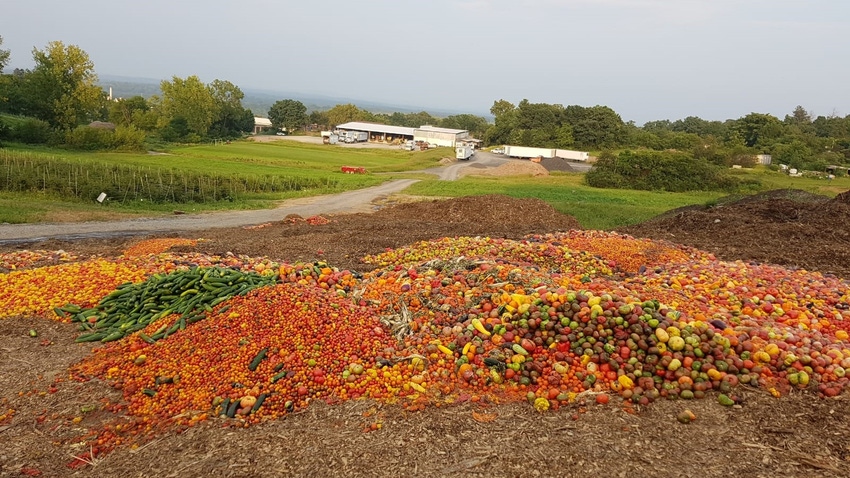Technology-driven Food Waste Reduction
An upcoming WasteExpo panel session will examine how technology is used to develop viable market platforms to address surplus food collection inefficiencies.

The world cannot sustainably feed nearly 10 billion global citizens by 2050 if food loss and waste remains between 30 and 50 percent of annual food production. There needs to be a positive impact on consumption and production patterns. Consumer expectations for corporate responsibility are rising, and organizations can gain competitive advantage by making food waste reduction a pillar of their larger sustainability strategy.
At this year’s WasteExpo, a panel of experts, academics and entrepreneurs will discuss how data and technology are being used to develop viable market platforms to address surplus food collection inefficiencies. Additionally, they will provide solutions to reduce food waste and ensure recovery of excess food and food scraps during the May 6 session, “Using Data and Technology to Drive Food Waste Reduction.”
Beaverton, Ore.-based Leanpath Inc. tackles food waste by tracking it because, according to Steven Finn, WasteExpo panelist and vice president of Food Waste Prevention for Leanpath, what organizations measure well, they manage well.
“We bring together hardware—including bench and flood scales, cameras, tablets and displays—with cutting-edge, customized software that enables culinary leaders to track all food waste events in their kitchens,” he says. “Each transaction is weighed, and critical data, such as food type, waste reason and disposition code, are captured immediately through a customized user interface. Our landmark bench scale marries this data with a digital picture of the wasted food as well, and all details are electronically stored in a cloud-based database.”
The data feeds a robust analytics program, Leanpath Online, which allows clients to analyze the drivers of their food waste with a high degree of granularity. An integrated dashboard provides summaries, participation and trend reports and talking points for weekly meetings with the kitchen staff.
Another panelist, Stephen F. Hamilton, professor of economics and graduate program director for the Orfalea College of Business at Cal Poly based in San Luis Obispo, Calif., along with co-author Timothy Richards of the Morrison School of Agribusiness & Resource Management at Arizona State University in Mesa, Ariz., will investigate the potential for commercial peer-to-peer mutualization systems (CPMSs), or sharing-economy organizations, to provide viable market platforms for exchanging surplus food during the session.
“Entrepreneurs are introducing cell phone applications and websites for buyers and sellers of ‘ugly produce,’ fresh fruit and vegetable items that are turned away from conventional sales channels due to imperfect size, shape and color or to a surplus in the retail market,” says Hamilton. “For example, a pallet of cucumbers that does not meet size restrictions at a pickling plant or peaches that are asymmetrically shaped but still healthy and perfectly tasty to eat.”
A large number of companies are entering this space, matching buyers and sellers of surplus food, delivering food that would otherwise go to waste directly to consumer's homes.
“My co-author [Richards] and I find that the critical conditions exist in the surplus food market to generate the kinds of network effects that are necessary for success in the sharing economy,” says Hamilton.
Finn will examine closing the measurement gap with data and technology to prevent food waste during the panel.
“The burgeoning food waste movement has led to much interest in the past few years to use data and technology to reduce food waste on the recovery side,” he says. “We’re seeing many technology platforms focused on matching organizations with excess food with relief organizations in need of that food, as well as facilitating pickup and distribution and tax reporting. And that’s great because while excess edible food is available, we all benefit by efficiently putting it to its best possible use, starting with feeding people.”
Finn says LeanPath believes that automated measurement is the optimal route to prevention.
“As we all know, what organizations measure, they manage. But measurement gaps exist throughout the foodservice world. For decades, food waste has been the ‘elephant in the kitchen’—hiding in plain sight, excessive but not effectively addressed,” he says. “Many organizations want to measure better but are unsure where to start. We believe that organizations must take control of their food waste and that frontline kitchen workers can and should play a pivotal role in that process. We provide a suite of innovative, integrated hardware and software tools that allow organizations to measure their food waste—closing those gaps—and then make the necessary operational changes to not only reduce their food waste but to prevent it from reoccurring in the future. “
Food waste also is a behavioral problem.
“That’s why we emphasize the human element. We connect frontline workers to the food waste challenge, for they are the key change-makers in institutional kitchens,” says Finn. “We embed a food waste prevention mindset in culinary institutions, making prevention a part of organizational DNA. And by inspiring kitchen staffs to take control of their food waste, our prevention-focused process naturally serves as a portal to the development of holistic, circular food optimization programs that include donation and composting.”
Ricky Ashenfelter, CEO of Spoiler Alert, and Brittany Buchanan, FreshCloud Global Business Lead for AgroFresh, round out the list of panelists.
About the Author(s)
You May Also Like


